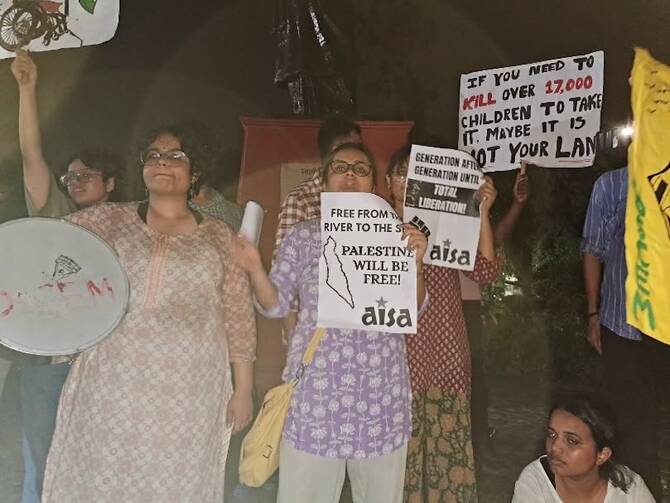NEW DELHI: India’s main opposition party and civil society members are demanding the government break its silence on Israel’s war crimes against Palestinians, after New Delhi abstained from voting on a UN resolution demanding a ceasefire in Gaza.
While 149 countries at the UN General Assembly overwhelmingly backed the resolution demanding aid access and an immediate, unconditional and permanent ceasefire in the besieged enclave on Thursday, India was among 19 countries that abstained, with 12 others voting against it.
India’s Permanent Representative to the UN Parvathaneni Harish said the abstention was based on “the belief that there is no other way to resolve conflicts but through dialogue and diplomacy,” adding that “a joint effort should be directed towards bringing the two sides closer.”
The government’s vote sparked an outcry in India, as politicians and members of civil society urged the government to return to its traditional foreign policy of supporting Palestine.
“This is a tragic reversal of our anti-colonial legacy. How can we, as a nation, just abandon the principles of our constitution, and the values of our freedom struggle that led the way for an international arena based on peace and humanity?” Priyanka Gandhi, MP and senior leader of the Congress Party, told Arab News on Saturday.
The move to abstain on the UN resolution was “shameful and disappointing,” she said, adding: “There is no justification for this. True global leadership demands the courage to defend justice, India has shown this courage unfailingly in the past.”
Many years before the establishment of Israel, Mahatma Gandhi, the leader of India’s liberation movement against British rule, had opposed a Jewish nation-state in Palestine, deeming it “inhumane.” For decades, other Indian leaders also viewed Palestinian statehood as part of the country’s foreign policy.
That support has only waned recently, with the current government forging partnerships with Tel Aviv and largely remaining silent in the wake of Israel’s deadly siege on Gaza. More than 55,000 Palestinians have been killed in the ongoing onslaught that began in October 2023, while more than 128,000 others have been injured and scores of others put in danger of starvation by Israel’s daily attacks and aid blockades.
“A humanitarian catastrophe is unfolding. Has India abandoned its principled stand against war, against genocide, and for justice?” KC Venugopal, MP and general secretary of the Congress party, told Arab News.
“India has long been a principled voice for ceasefire, peace, and dialogue in the Middle East. Rooted in our legacy of non-alignment and moral diplomacy, India has historically championed the cause of justice and humanitarian values in global conflicts,” he said.
“At a time when the region is witnessing unspeakable violence, humanitarian collapse, and growing instability, India cannot afford to remain silent or passive.”
Apoorvanand Jha, a professor at the University of Delhi, said that India “has chosen to stand behind bullies” by choosing to abstain from the UN vote.
“It’s very clear that India has lost its moral standing … I definitely demand the government continue with traditional Indian foreign policy, which was to stand with Palestine, stand against aggression in any form, and that should lead it to oppose Israel’s aggressive stance in the matter of Palestine,” Jha told Arab News.
“It has to tell Israel. It has to take a definite stand in the UN and elsewhere that it doesn’t support Israel (and) Israel’s aggression.”
















